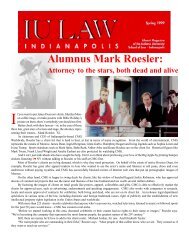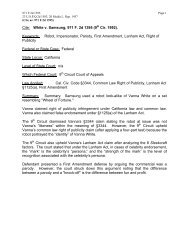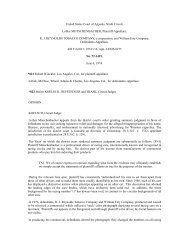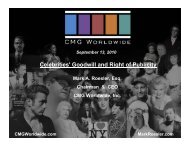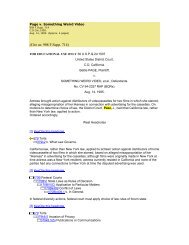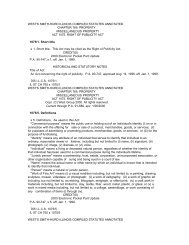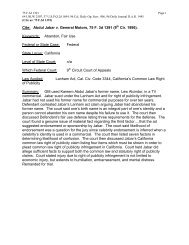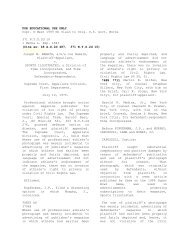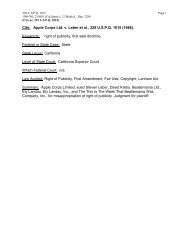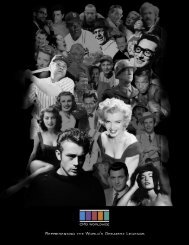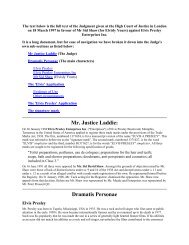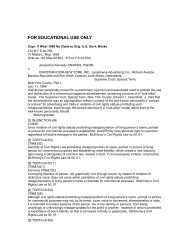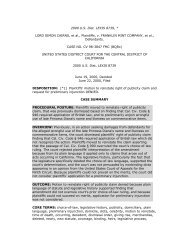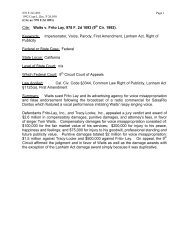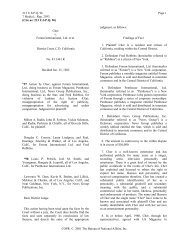Hustler v. Falwell.pdf - Mark Roesler
Hustler v. Falwell.pdf - Mark Roesler
Hustler v. Falwell.pdf - Mark Roesler
You also want an ePaper? Increase the reach of your titles
YUMPU automatically turns print PDFs into web optimized ePapers that Google loves.
political debate. Nast's castigation of the Tweed Ring, Walt McDougall's<br />
characterization of presidential candidate James G. Blaine's banquet with the<br />
millionaires at Delmonico's as "The Royal [*55] Feast of Belshazzar," and<br />
PAGE 8<br />
485 U.S. 46, *55; 108 S. Ct. 876, **881;<br />
1988 U.S. LEXIS 941, ***16; 99 L. Ed. 2d 41<br />
numerous other efforts have undoubtedly had an effect on the course and<br />
outcome<br />
of contemporaneous debate. Lincoln's tall, gangling posture, Teddy Roosevelt's<br />
glasses and teeth, and Franklin D. Roosevelt's jutting jaw and cigarette holder<br />
have been memorialized by political cartoons with an effect that could not have<br />
been obtained by the photographer or the portrait artist. From the viewpoint of<br />
history it is clear that our political discourse would have been considerably<br />
poorer without them.<br />
Respondent contends, however, that the caricature in question here was so<br />
"outrageous" as to distinguish it from more traditional political cartoons.<br />
There is no doubt that the caricature of respondent and his mother published<br />
in <strong>Hustler</strong> is at best a distant cousin of the political cartoons described<br />
above, and a rather poor relation at that. If it were possible by laying down a<br />
principled standard to separate the one from the other, public [***17]<br />
discourse would probably suffer little or no harm. But we doubt that there is<br />
any such standard, and we are quite sure that the pejorative description "<br />
[**882] outrageous" does not supply one. "Outrageousness" in the area of<br />
political and social discourse has an inherent subjectiveness about it which<br />
would allow a jury to impose liability on the basis of the jurors' tastes or<br />
views, or perhaps on the basis of their dislike of a particular expression. An<br />
"outrageousness" standard thus runs afoul of our longstanding refusal to allow<br />
damages to be awarded because the speech in question may have an adverse<br />
emotional impact on the audience. See NAACP v. Claiborne Hardware Co., 458<br />
U. S.<br />
886, 910 (1982) ("Speech does not lose its protected character . . . simply<br />
because it may embarrass others or coerce them into action"). And, as we stated<br />
in FCC v. Pacifica Foundation, 438 U. S. 726 (1978):<br />
"The fact that society may find speech offensive is not a sufficient reason for<br />
suppressing it. Indeed, if it is the speaker's opinion that gives offense, that<br />
consequence is a reason for according it constitutional protection. [*56]<br />
For it is a central tenet of the First Amendment that the government must<br />
remain<br />
[***18] neutral in the marketplace of ideas." Id., at 745-746.<br />
See also Street v. New York, 394 U. S. 576, 592 (1969) ("It is firmly settled<br />
that . . . the public expression of ideas may not be prohibited merely because<br />
the ideas are themselves offensive to some of their hearers").<br />
Admittedly, these oft-repeated First Amendment principles, like other<br />
principles, are subject to limitations. We recognized in Pacifica Foundation,<br />
that speech that is " vulgar,' offensive,' and shocking'" is "not entitled to<br />
absolute constitutional protection under all circumstances." 438 U. S., at 747.<br />
In Chaplinsky v. New Hampshire, 315 U. S. 568 (1942), we held that a state<br />
could



